5% growth target set, government will try for 6%
4 min readISLAMABAD: The National Economic Council has approved the Annual Plan and macroeconomic framework for 2022-23 with five percent GDP growth for the next fiscal year and the Public Sector Development Programme (PSDP) worth Rs2.1384 trillion, including Rs800 billion federal and Rs1,384 billion provincial.
The meeting presided over by Prime Minister Shehbaz Sharif was presented by the Ministry of Planning a review of the Annual Plan for the year 2021-22 to the NEC and gave a detailed briefing on the targets for the year 2022-23.
The council approved annual targets for the fiscal year 2022-23 of five per cent GDP growth for the next fiscal year with efforts to increase it to six per cent. The growth target for the agriculture sector was set at 3.9 percent, industry at 5.9 percent, and services sector at 5.1 percent.
The broad-based revival of the LSM is projected to sustain growth at 7.4 percent during 2022-23.
The overall manufacturing sector is projected to post growth of 7.1 percent during 2022-23.
The services sector will also be subject to moderation in growth and is targeted to grow by 5.1 percent in 2022-23 which is still lower than its five-year pre Covid-19 annual average growth of 5.3 percent.
Expected performance in both the agriculture and industrial sectors will complement the targeted growth in the services sector.
Investment level for the year 2022-23 is expected to decrease slightly to 14.7 percent of the GDP due to stabilization and an uncertain economic environment.
Fixed investment is expected to grow by 13 percent on a nominal basis. However, as a percentage of the GDP it will decrease marginally as compared with last year and will remain around 13 percent of the GDP in 2022-23.
The National Savings rate is targeted at 12.5 percent of the GDP.
The prime minister directed that efforts should be made to reduce the price of essential commodities and inflation and all the provinces should take steps in this regard. Special attention should be paid to the growth of the agriculture sector.
The meeting was also presented a review of the development budget for 2021-2022 and was informed that a development outlay of Rs900 billion was for the ongoing fiscal year, however, due to the corona epidemic, economic and development activities have been reduced and only Rs550 billion could be spent.
The NEC approved a proposal to allocate a federal development budget of Rs800 billion for the financial year 2022-23 and decided that 60 percent of the development budget should be spent on ongoing projects and 40 percent on new projects.
The prime minister said that special projects should be started for the development of the poorest areas including the districts of Balochistan and directed that important and big projects be included in the PSDP which would help in the development of the country. The NEC also approved revised powers for approval of development projects of development forums including the ECNEC, the CDWP, and the DDWP.
Speaking during the meeting, the prime minister said that the NEC was a manifestation of national unity and its main objective was to enhance national cohesion to strengthen the federation through concerted efforts, and it should take into account inequality and it is the collective responsibility of the federation and the provinces to play their role for balanced regional development.
He further stated that past unwise policy measures have created a situation where external and internal challenges have threatened economic stability and the present government has inherited an economy that faces volatile financial conditions and dangerous challenges such as the external sector, inflation, unemployment, poverty and instability.
“We are fully aware of the extraordinary internal economic instability and external challenges,” the prime minister said.
He further stated that the government has not only steered the economy in the right direction but in its first short-term has also taken steps to reform the energy sector as well as to rectify the imbalances in the internal and external sectors.
He added that improving people’s jobs and living standards is one of the top priorities of his government.
Improving social decimals and increasing investment in manpower are part of my government’s long-term vision, he said.
Taking advantage of the potential of the economy through social welfare, protection of water resources, agriculture, climate change, knowledge economy and regional equity is the main focus of our development framework, he said adding that these priorities are a key part of our development framework.
The premier said that the government is focused on improving infrastructure and governance, providing uninterrupted and low-cost energy, quality education and the equitable provision of basic health care. We believe in improving the lives of people in the region through shared regional values and responsibilities for economic inclusion, poverty alleviation, institutional reform, infrastructure, education, vocational training and the provision of better health care, he added.
Shehbaz Sharif said that the government is well aware of the difficulties posed by the global economic environment and domestic conditions.
Conditions are difficult but not invincible. We are committed to resolving these issues and taking all necessary steps. The fruits of our efforts in many fields have also begun to come. We are convinced that a stable economy and a secure environment are the keys to peace and prosperity in the world and in the region, the prime minister said.
For the latest news, follow us on Twitter @Aaj_Urdu. We are also on Facebook, Instagram and YouTube.


















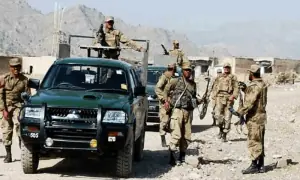
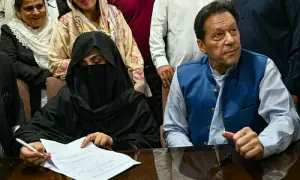

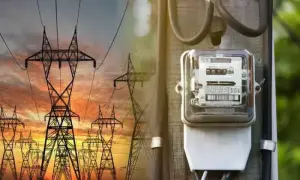

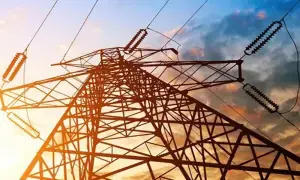
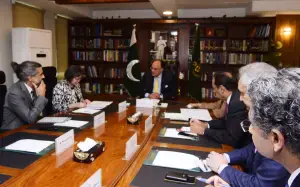


Comments are closed on this story.